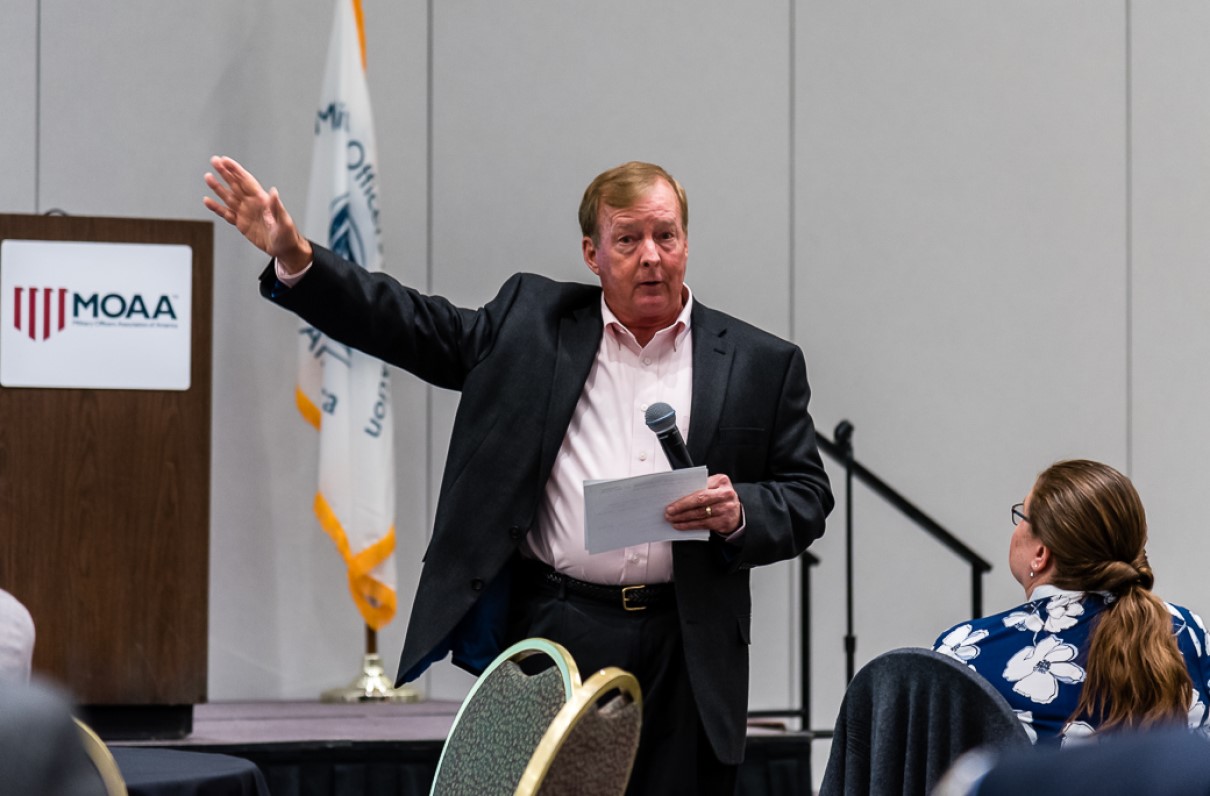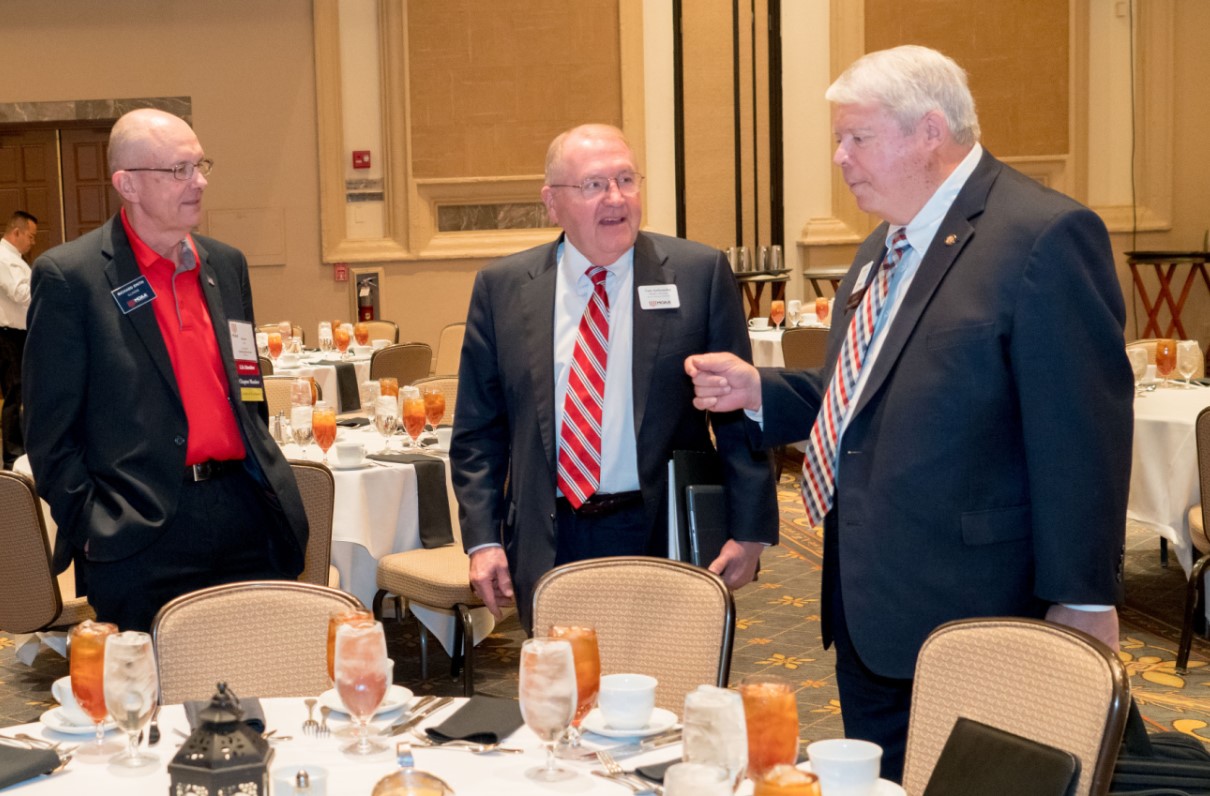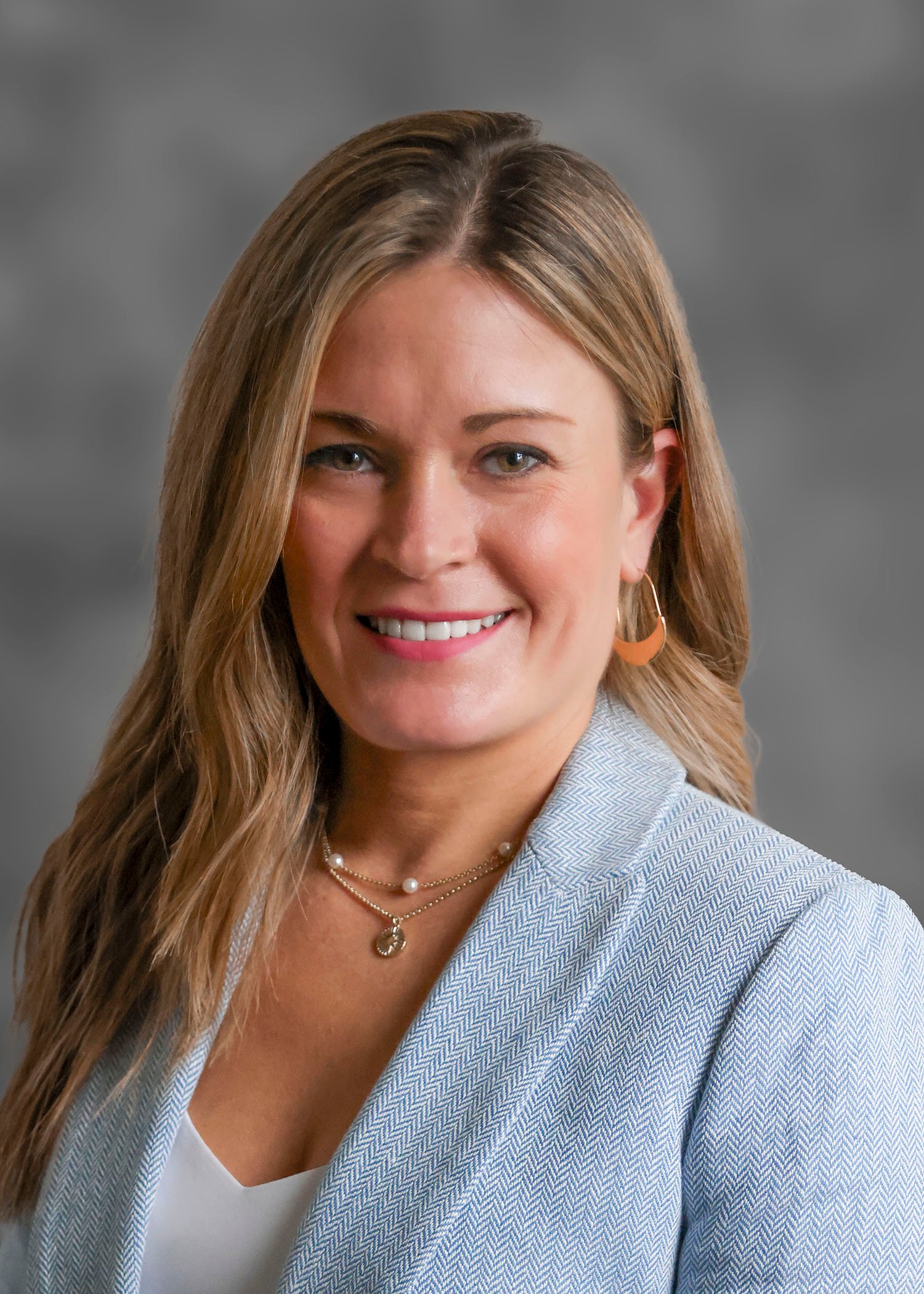By Blair Drake, MOAA Contributing Editor
Leaders from MOAA affiliates in Idaho, Nevada Oregon, Northern California, and Washington joined together in Portland, Ore., May 3-4 for the Pacific Northwest Region Council And Chapter Leadership Workshop.
The event, comprising presidents, membership chairs, legislative liaisons, and surviving spouse liaisons from 16 councils and chapters, gave attendees the opportunity to learn best practices for chapter management, receive updates about national MOAA, and share tips and ideas.
During the opening session Friday afternoon, Lt. Gen. Dana T. Atkins, USAF (Ret), MOAA president and CEO, provided an overview of national MOAA, highlighting accomplishments, priorities, and challenges.

Anne Hartline, chair of MOAA’s Surviving Spouse Advisory Committee; Gail Joyce, MOAA board of directors; and Col. David Casteel, USAF (Ret), president of the Washington Council of Chapters, talk on Friday afternoon.
On the legislative front, Atkins discussed several key issues, including ending the widows tax, stabilizing and improving TRICARE, and protecting military pay and benefits — topics that were the focus of April’s Storming the Hill lobbying event.
He also addressed the current political environment. “The political environment is, quite frankly, adversarial, so we find that to be a challenge,” he said. “But we need to find a way to navigate around that in order to be successful.”
Regarding membership, Atkins pointed out that, like for other associations, it’s a challenge, but MOAA’s membership has been “relatively stable, with an especially stable life membership. “
He says the association continues to focus on marketing and brand awareness and on membership engagement, especially through digital platforms. “We’ve done a lot to advance the association into the digital world and make us more efficient,” Atkins said. “We’ve also done a lot to embrace technology to help chapters with administration and management.”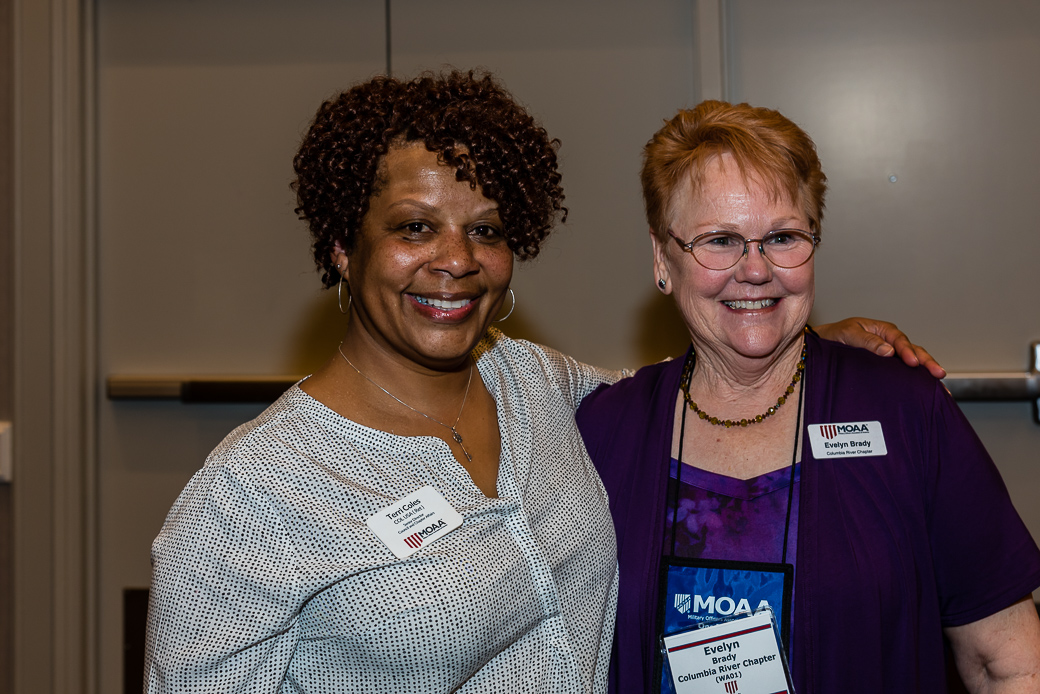
Col. Terri Coles, USA (Ret), MOAA senior director, Council and Chapter Affairs, and Lt. Col. Evelyn Brady, ARNG (Ret), president of the Columbia River (Wash.) Chapter, pose for a photo during Friday’s dinner.
He concluded by calling on attendees to continue to share the value of MOAA membership in their communities.
Kathy Partain, vice president for Membership and Marketing, reiterated the importance of working together for recruiting, retaining, and engaging members. “It takes everyone to be successful with membership,” she said. “You all have that proximity to prospective members to continue to engage. Peer-to-peer contact is a key recruiting and retention tool.”
She updated attendees on current marketing campaigns, changes to the membership model, and efforts to address the challenge of attracting younger members. “I think with the right value proposition to get their interest, [younger members] will join us,” she said.
She offered this advice for talking to potential members about MOAA: “Focus on the individual and what’s important to them at that moment. Ask a lot of questions, and tailor your response.”
After the membership update, Gail Joyce, a member of MOAA’s board of directors, briefed attendees about the role of surviving spouses in MOAA. She reminded chapter leaders that surviving spouses not only can hold leadership positions in chapters but also are eligible to join MOAA on their own and are voting members of the association.
“[Surviving spouses] are organizers, creative, and think outside the box,” Joyce said. “We’re resilient, flexible, and an asset to this organization.”
She also encouraged chapter leaders to be diligent in welcoming and engaging surviving spouses in their chapters.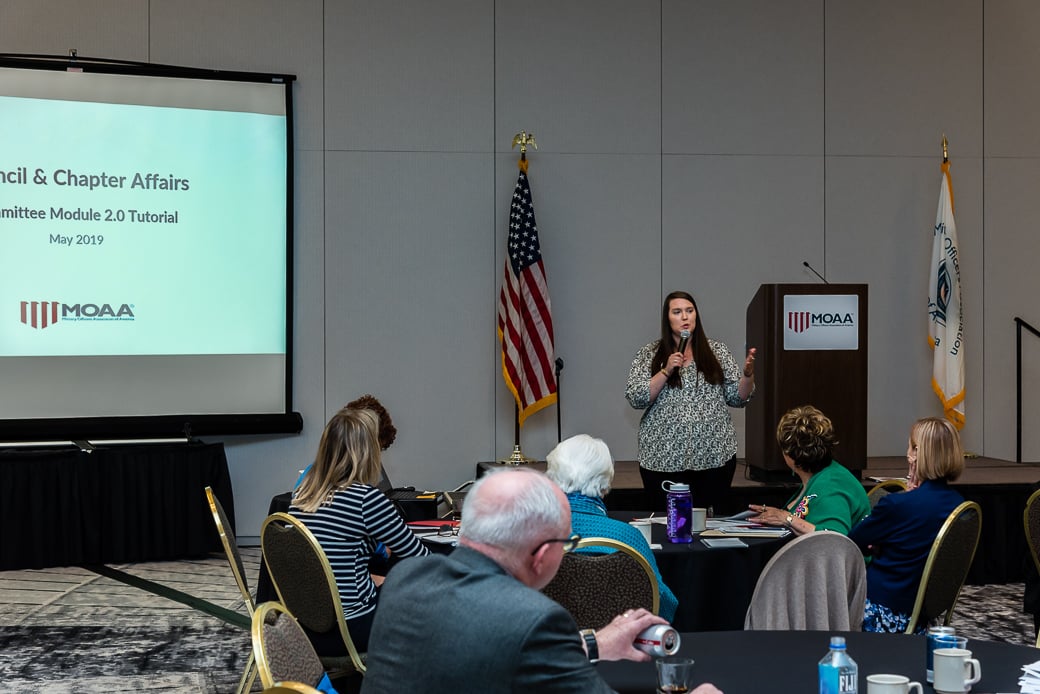
Rebecca Culhane, MOAA chapter affairs specialist, demonstrates how to use the Committee Module tool.
Role-Specific Training
On Saturday morning, the workshop divided into three breakout sessions: chapter management training, legislative training, and, for the first time, surviving spouse training. These sessions gave leaders the opportunity for role-specific guidance in smaller groups that provided more time for discussion.
In the chapter-management training, Coles reminded leaders about the “healthy chapter model,” based on a defined mission, legislative advocacy engagement, community involvement, and membership growth.
She also offered tips for recruiting, leadership succession, and fundraising and highlighted chapter-management tools national MOAA provides to chapter leaders.
In the legislative training session, Capt. Erin Stone, JAGC, USN (Ret), program director, Council and Chapter Affairs, talked with chapter legislative liaisons about national legislative priorities and challenges. She emphasized the importance of grassroots advocacy for success at both the state and national levels and shared initiatives to support advocacy efforts at the state level, including the online State Report Card, collaboration through virtual chapters, and a point of contact at MOAA national.
In the new surviving spouse training, Anne Hartline, chair of the Surviving Spouse Advisory Committee, spoke about how surviving spouses and spouses can contribute to MOAA councils and chapters. “Many chapters are hurting leadership-wise, and what better place to pull leaders from than spouses and surviving spouses,” she said. “As spouses of servicemembers, we planned events, and those experiences translate to chapter leadership.”
The women in the session shared the successes and challenges they’ve had with getting spouses involved in their chapters, including ideas for programs that might be of interest to those members.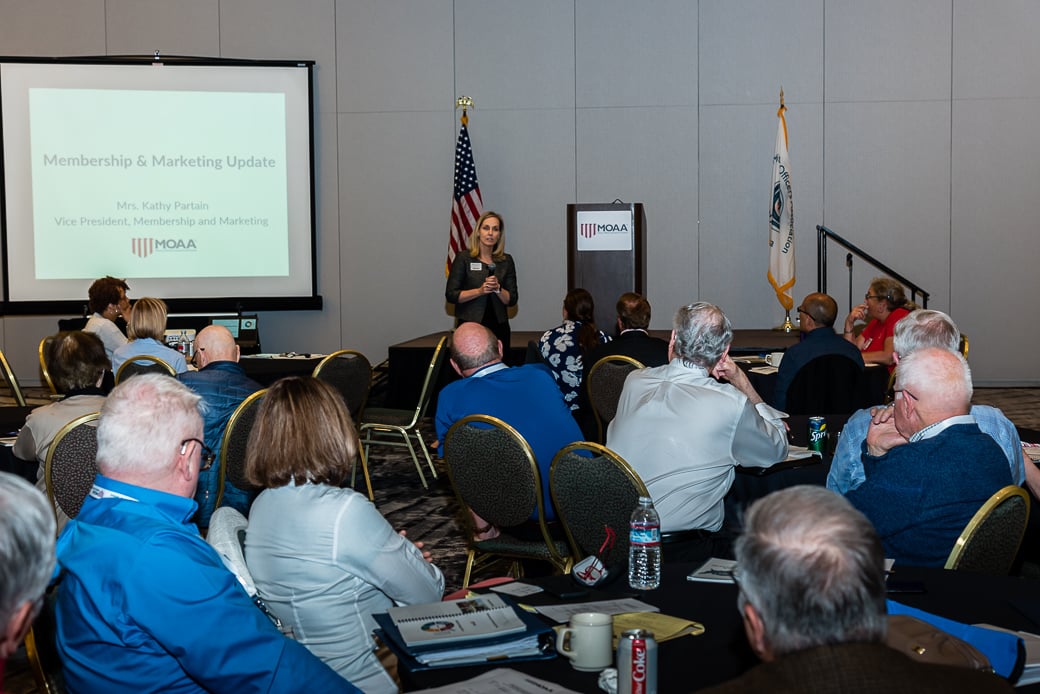
Kathy Partain, MOAA vice president for Membership and Marketing, updates attendees on marketing and brand awareness campaigns.
Hartline suggested chapters get the email addresses of members’ spouses to ensure they also receive newsletters and other communication. She also reminded attendees about the publications national MOAA offers regarding survivor issues.
Following the breakout sessions, everyone joined back together for a brief training session on the Committee Module tool, which allows chapter leaders to update their rosters.
All attendees received a workbook that included presentations from each session of the seminar as well as other tips, resources, and contact information.
This was the second of four regional leadership workshops national MOAA hosts each year. The next workshop will be held in Hershey, Pa., Sept. 6-7 for councils and chapters in the Northeast region.
